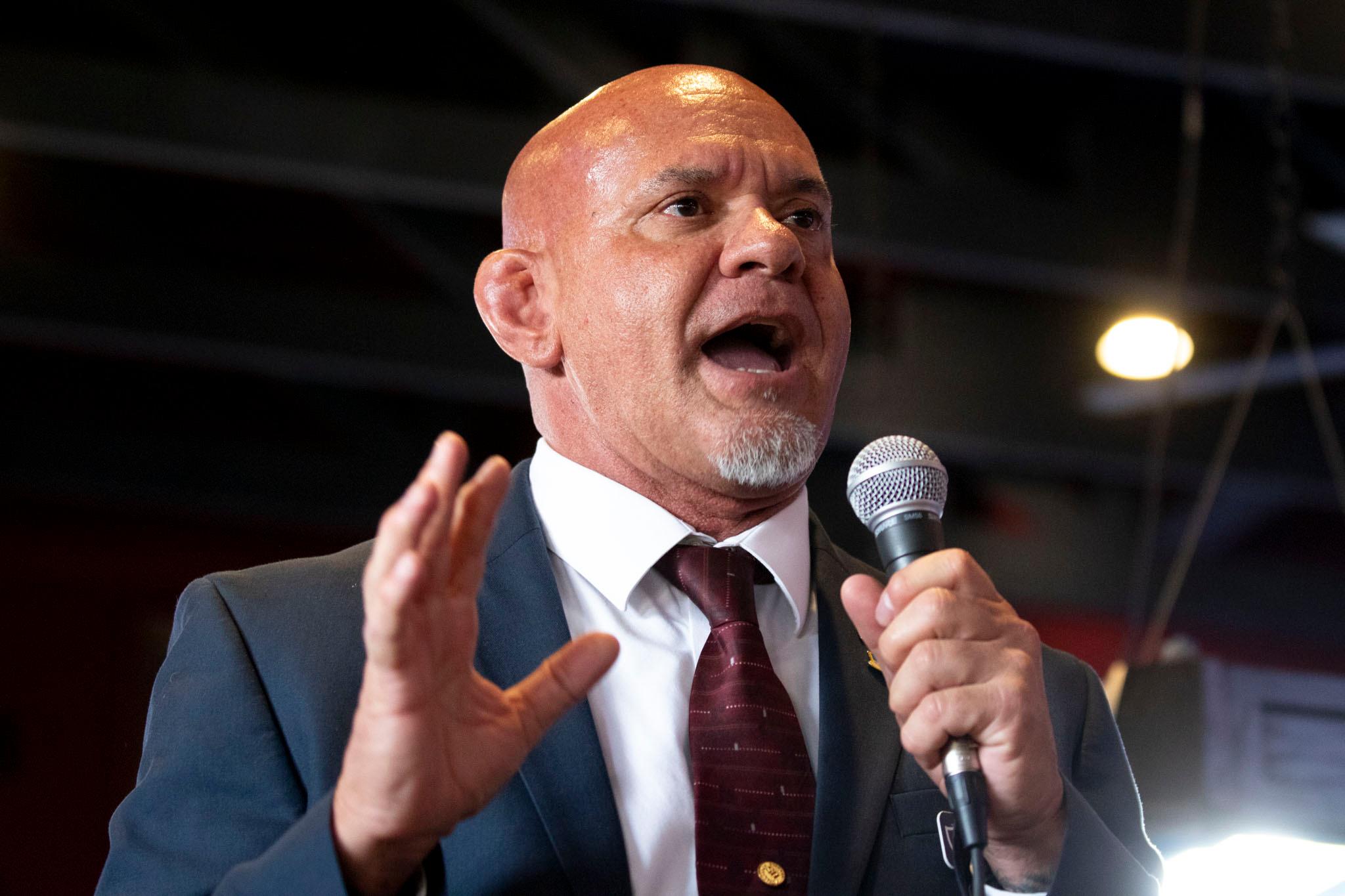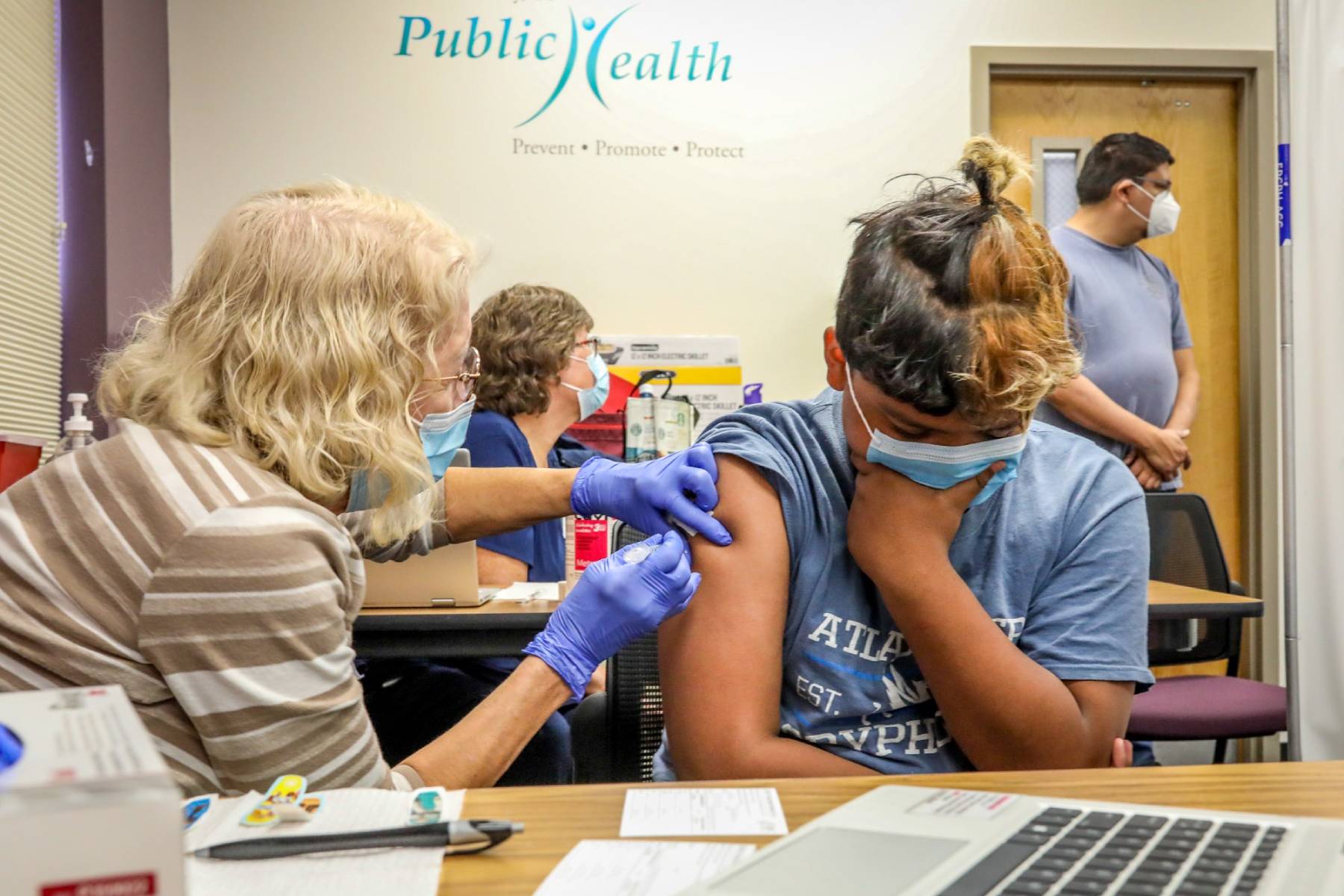
The GOP candidate running for CO-6 is John Fabbricatore, the former field office director for Immigration and Customs Enforcement for Denver from 2017-2020. He was unanimously selected by the GOP’s 6th District caucus in April.
Immigration policy and border control have been his main campaigning points.
“I've seen Aurora grow and I've seen what it's capable of. But we also have an issue and a problem now in Aurora with crime and it's illegal migrant crime that we're seeing.” He said at a campaign rally in early September. The event was headlined by Thomas Homan, who served as acting head of ICE under former President Donald Trump, and Texas Rep. Chip Roy.
He independently published the book, “DE-ICED: America in the era of open borders and unchecked immigration” in April. He has made multiple appearances on Fox News and in the Daily Caller to discuss Colorado’s immigration situation.
Fabbricatore is a veteran; he served four years in the Air Force and as a Security Police and Security Forces member. In 1997, while working for the Federal Protective Service, he was sent to Colorado to work on both Oklahoma City bombing trials. Two years later, he became an officer with the precursor to ICE, the U.S. Immigration and Naturalization Service (INS), in Denver. In 2003, he became an ICE instructor at the Enforcement Removal Operations Academy at the Federal Law Enforcement Training Center.
CPR News is part of Voter Voices, a statewide effort to ask Coloradans what issues matter most to them in this election. We used those responses to develop the questionnaire CPR sent to major party candidates. Archuleta’s answers are below.
John Fabbricatore on the economy and cost of living
What would you do, as a member of Congress, to address the cost of housing?
In Congress I would lower the cost of housing by letting the market work and removing federal barriers to home construction. Many localities push burdensome regulations that can raise the cost of home construction by 30-50% or have zoning rules that are extremely restrictive, raising the cost even further. In many cases, the government IS the problem. Further, Inflation has pushed mortgage rates higher and higher, we must reduce government overspending to rein in inflation and push the market back to normal levels.
What can Congress do to address inflation, particularly around the cost of food?
Congress can address inflation by reining in spending. However, that is just the start, longer-term fiscal reforms are necessary to lower inflation. In the near term, I believe we should give families a tax break to offset the burden of inflation and ensure that social safety net programs are kept up. Longer term, we need to get spending to a reasonable level and peg government increases to inflation, outside of a time of war, to 3% per year.
What are your views on raising tariffs on foreign goods?
Tariffs are not a cure-all, but companies who move American jobs overseas should not be rewarded. One of the reasons companies move to China is because they have little to no safety regulations and pay workers practically nothing. That kind of behavior is currently rewarded in the tax code and that’s wrong. I support creating a tax benefit for companies that grow jobs here rather than a current system of tax loopholes for sending them abroad.
John Fabbricatore on democracy and good governance
What are your top three ideas for reforms to make Congress work better?
Government works better if we follow the processes in place. Take the budget for instance, we currently don’t do a real appropriations markup and instead make decisions on appropriations bills on the floor with amendments and riders done outside the scope of the appropriations process, that’s no way to run a government. We should get back to the basics.
Second, I think the constant pursuit of ‘gotcha’ votes and amendments on key bills takes away from the seriousness of the business being conducted and hinders our ability to pass legislation.
Lastly, we can work better by working together. When elected, I am going to introduce myself to every colleague. There is more that unites us than divides us and I will find something I can agree with every colleague on.
If control of the federal government remains divided between the parties after the election, how do you plan to be effective for your district?
My plan to be effective for my district is to work within the Colorado delegation. Having members of both parties in DC makes us more effective, there is always something to work together on and we will need to find it. One thing we shouldn’t be afraid to do is compromise, one of the major dysfunctional things about congress is that no one is willing to make a deal and get results.
There is an initiative on Colorado’s ballot to do away with party primaries and institute ranked choice voting. How will you vote on it and why?
I am firmly against ranked choice voting and would not support it in congress.
Do you trust the current electoral system in Colorado? What about the rest of the country?
Colorado’s system isn’t perfect, I would prefer more verification and cleaner voter rolls. I also support the SAVE Act and believe we need to have a voter system that is trusted by everyone no matter your party affiliation.
John Fabbricatore on immigration
How should the U.S. Congress address current and future waves of people crossing at the border?
The Immigration law of the United States needs to be enforced. The best way to do that is to follow the letter of the law as written in the Immigration and Nationality Act (INA) and Title 8 of the US Code of Federal Regulations (Aliens and Nationality). Following the law and addressing illegal immigration as it occurs is the only way to ensure an orderly and lawful Immigration system that works.
Name one aspect of the current legal immigration system the U.S. Congress should reform or abolish, and why?
The current Asylum laws must be reformed to immediately have a Credible Fear interview and preliminary hearing before a judge within a minimized time period and not the multi-year wait that the current administration has allowed. We must identify Asylum fraud or misuse very early in the process and not allow applicants to stay for years before they see a judge.
What should the U.S. do about people who have lived in the country for a long time without documentation, including so-called Dreamers?
I do not support blanket amnesty; it is important to recognize that our current legal framework provides a process known as Cancellation of Removal. This pathway allows individuals who are illegally present in the country to have their cases heard by an Immigration Judge, provided they have no felonies or crimes involving moral turpitude.
Breaking the law should not automatically result in amnesty. Each case, including those of Dreamers, requires careful scrutiny. A thorough review on a case-by-case basis is essential to assess eligibility for Cancellation of Removal and potential pathways to resident status. By doing so, we maintain the integrity of our legal system while allowing fair opportunities for those who meet the criteria.
John Fabbricatore on climate and natural resources
What is the most pressing environmental or natural resource issue facing Colorado?
The most pressing resource facing Colorado is water. Our elected leaders need to ensure that Colorado gets its fair share from the snowmelt and rainfall to meet its needs before the rivers flow south and people can irrigate the desert in Arizona. As our population grows in the West this issue will become more and more present, and we need to codify Colorado’s place now.
What are the most urgent steps the country should take to address climate change, if any?
I think the so-called ‘green’ mandates are wrongheaded and don’t just hurt businesses and individuals, but by over-codifying we stifle innovation. If we let the markets work, we can get better and cheaper sources of energy. My concern with mandates is the cost it places on consumers, who are forced to pay more to heat and light their homes. Further, countries like China don’t obey these mandates and we are unilaterally disarming ourselves of reliable sources of energy.
Should the federal government take steps to limit new oil and gas production on public lands?
We should allow for reliable extraction on public lands. Too many livelihoods depend on these industries and we must allow for cheap, reliable sources of energy to be utilized.









